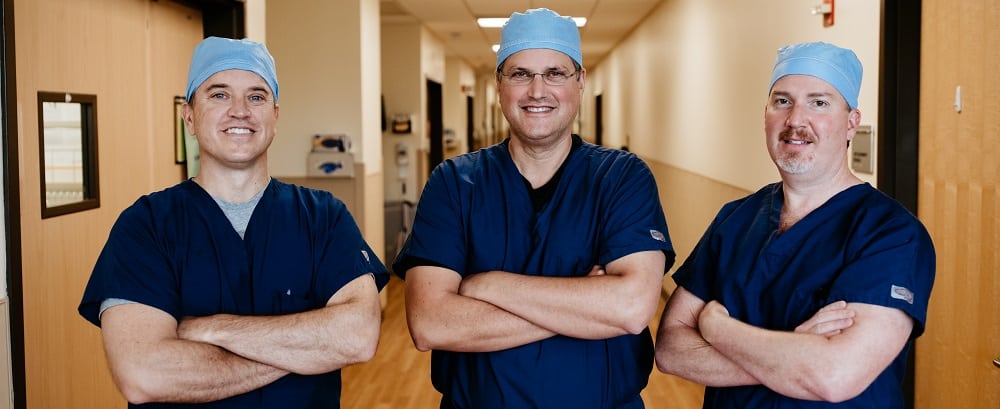Setting the Standard for Hernia Surgery in Georgia
As Georgia’s first accredited Hernia Surgery Center of Excellence, Northeast Georgia Medical Center offers you access to the most advanced robotic and minimally invasive surgical techniques for hernia repair – right here at home. Our team of experienced surgeons are nationally recognized by the Surgical Review Corporation for their commitment to improving the quality of care for patients who undergo hernia surgery.
What this means for you:
Faster Recovery, Less Pain
Robotic hernia repair utilizing the da Vinci Surgical System is changing the experience of surgery for patients. Through cutting-edge technology, more complicated procedures can be performed through smaller incisions providing patients a faster recovery with less pain.
Experienced Surgeons
The surgeons at The Hernia Center have performed nearly 7,500 minimally invasive hernia repairs and more than 2,000 robotic hernia repairs using the da Vinci surgical system. For you, this means cutting-edge, high-quality care from an experienced, caring team of providers – close to home.
Nationally-Benchmarked Care
Northeast Georgia Medical Center Gainesville’s team of experienced hernia surgeons, led by Drs. Chad Copper and Ron Lewis, are among an elite group of surgeons nationally recognized for their commitment to improving the quality of care for patients who undergo hernia surgery.
Our Expertise
- High success rate: NGMC’s first 5 years of robotic hernia repairs show an 8% hernia recurrence rate, which is half the normal published recurrence rate of most laparoscopic and open hernia repairs of similar patients.
- Few complications: Our team actively tracks recurrence rate and infection and has a lower than the national average in both categories.
- Back to work quickly: Most laparoscopic or robotic inguinal hernia patients are able to return to a modified (light) work routine within one week of surgery and back at full capacity without restrictions at two weeks. Most robotic ventral hernias patients can return to a modified (light) work routine two weeks after surgery and back to full activity without restrictions at six weeks.
- Complex hernia repair: Our experienced surgeons are respected regionally for their outcomes with complex hernia repair, including abdominal wall reconstruction or diastasis recti repair.
Patient Stories
Frequently asked questions
Here are some of the questions you may be asking as you consider hernia repair surgery.
The cost to repair a hernia depends on your insurance coverage and the complexity of the procedure that you need.
If left untreated, a hernia can lead to serious complications, including:
- Bowel obstruction that causes severe pain, nausea or constipation.
- Intestinal strangulation if the trapped section of the intestines does not get enough blood.
While many insurance companies do NOT require a referral to see a general surgeon for hernia repair, some insurance companies do. If you are unsure if you need a referral, please call us at 770-219-4040. Our pre-registration teams will collect your insurance information and obtain the appropriate referral for you.
In most cases, Northeast Georgia Medical Center surgeons use minimally invasive techniques, such as robotic hernia repair or laparoscopic hernia surgery to repair hernias.
Northeast Georgia Medical Center surgeons evaluate each case individually to develop the most appropriate treatment plan for each patient. Our surgeons are highly skilled at mesh and non-mesh repair techniques for hernias of all complexity.
In most cases, our surgeons use synthetic mesh for hernia repairs. Synthetic mesh is a safe medical mesh that is used in most hernia repairs. Multiple randomized clinical trials have shown that mesh is safe and is associated with a significant decrease in hernia recurrence compared to non-mesh repairs. Synthetic mesh is either absorbable or nonabsorbable
Mesh can also be made from either animal tissue that comes from the skin or intestines. Animal tissue mesh is absorbable.
The goal of the absorbable mesh using either animal or synthetic tissue is to reinforce the abdominal wall tissues and allow for natural tissue growth.
It is essential to choose a surgeon who has extensive training in hernia repair to close the abdominal wall tissues successfully.
If your doctor determines you need a no-mesh repair, your surgeon will use your body’s tissues, which may reduce the risk of complications.
Learn more about the safety and efficacy of mesh hernia repair from the Americas Hernia Society.
About Robotic Hernia Surgery:
The da Vinci Surgical System is a tool that utilizes an advanced, robotic, computer, and optical technologies to assist your surgeon with your operation. It does not act on its own, and your surgeon controls its movements.
The da Vinci Surgical System has a 3D high definition (3D-HD) vision system, special instruments and computer software that allow your surgeon to operate with enhanced vision, precision, dexterity and control. The 3D-HD image is highly magnified, so your surgeon has a close-up view of the area he or she is operating on.
The da Vinci instruments have mechanical wrists that bend and rotate to mimic the movements of the human wrist – allowing your surgeon to make small, precise movements inside your body.
And, da Vinci software can minimize the effects of a surgeon’s hand tremors on instrument movements.
The most appropriate candidates for robotic hernia repair surgery are people who develop groin, incisional, umbilical or Hiatal hernias.
- Groin hernia: A groin hernia is a bulge from a weakened muscle in the abdomen. A groin hernia is more common in men than in women.
- Incisional hernia: An incisional hernia is a hernia that forms around a prior surgical incision in the abdomen.
- Umbilical hernia: An umbilical hernia is a weakness that develops in the abdominal muscles in the belly button. This type of hernia generally occurs in babies.
The benefits of robotic hernia repair and laparoscopic hernia repair surgery over open surgery are similar.
You may experience:
- Minor pain or discomfort for a few days after robotic hernia repair surgery
- A mild fever
- Fatigue
- Nausea
- Twinges or pulling in the affected area when you move
Most patients feel better within seven days.
Robotic hernia surgery is a minimally invasive surgery that is generally safe; however, complications can occur with any type of surgery. Complications may include:
- Infection
- Recurrence of a hernia
- Reaction to anesthesia
What to expect once you are scheduled for surgery:
Robotic hernia repair surgery will be performed under general anesthesia; therefore, you should not eat or drink anything after midnight on the night before surgery.
Your care team will outline what you need to do to prepare for surgery. Guidelines include:
- Stop smoking
- Lose weight – a healthy BMI is associated with decreased preoperative complications and risk of hernia recurrence
- Diabetes – if you are diabetic, we recommend that your diabetes is controlled prior to surgery with an HbA1c < 7.0
The recovery period for patients who undergo robotic hernia repair surgery is approximately two weeks. This is compared to four to six weeks with open hernia surgery and three to four weeks with laparoscopic hernia repair surgery.
Follow your doctor’s instructions on what you should and should not do after robotic hernia surgery. Instructions include:
- Get an appropriate amount of sleep.
- Walk each day and gradually increase the distance you walk.
- Avoid strenuous activities, such as jogging or weightlifting.
- Do not drive until your doctor gives you clearance.
- Wait until your doctor gives you the approval to shower – typically 24 to 48 hours after surgery.
- Do not have sex until you have clearance.
- Drink plenty of fluids.
- Restart medicines following your doctor’s instructions.
- Take medications exactly as prescribed. Narcotic pain medication should only be taken if your pain is uncontrolled with non-narcotic pain medications such as Tylenol and Advil.
- Leave the bandages and tape on the incision site until your doctor has given you instructions to remove it.
- If you have staples along the incision sites, schedule an appointment with your doctor within one to two weeks to have them removed.
- Wash the affected area daily with soapy water. Do not use hydrogen peroxide or alcohol.
Our team has prepared a pre- and post-operative pain control document to help our patients.
Other common questions:
While hernia repair surgery is generally very safe, complications can occur.
Complications may include:
- Infection
- Recurrence of hernia
- Bleeding
At the Hernia Center of NGMC, we do treat patients who need hernia revision surgery, although the risk of needing a second revision surgery is low.
Clinic Locations
NGPG Surgical Associates
1439 Jesse Jewell Pkwy, Ste. 302
Gainesville, GA 30501
Longstreet Clinic
727 Jesse Jewell Pkwy SE
Gainesville, GA 30501
Confirm the location before your appointment
Surgery Locations
Northeast Georgia Medical Center
743 Spring Street
Gainesville, GA 30501
Gainesville Surgery Center
1945 Beverly Road
Gainesville, GA 30501
Confirm the location of your surgery before the day of your appointment
Request an appointment
To request an appointment, please call our scheduling coordinator at 770-219-4040 or use the form on this page.



